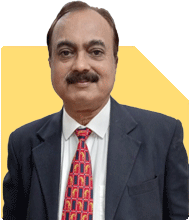Ramalingam Kalirajan |7059 Answers |Ask -Follow
Mutual Funds, Financial Planning Expert - Answered on Jun 24, 2024
He has an MBA in finance from the University of Madras and is a certified financial planner.
He is the director and chief financial planner at Holistic Investment, a Chennai-based firm that offers financial planning and wealth management advice.... more

I am 46 yrs Old, my total balance is one cr. My wife is also 46 yrs with 1 Cr balance.if we retiee now we will get pension of 1.25 L per month each. Should we retire ? Our monthly expenditure 1L per month. Two kids studying in IT colleges.
Assessing Your Monthly Expenses
First, let's look at your monthly expenses. You spend Rs. 1 lakh per month. This is a reasonable amount, but it will increase with inflation. Inflation affects costs of living, education, and healthcare. So, you need to plan for rising expenses.
Evaluating Your Income Sources
Your pensions total Rs. 2.5 lakhs per month. This is more than double your current monthly expenses. On the surface, it looks sufficient. But we need to dive deeper to ensure long-term financial stability.
Considering Your Children's Education
Your kids are in IT colleges. Higher education costs can be significant. Even if they have scholarships or loans, you might need to support them. So, consider these costs in your financial planning.
Inflation and Its Impact
Inflation reduces purchasing power over time. If your expenses are Rs. 1 lakh now, they will rise in the future. Your pension should cover these increased expenses. Also, your savings should grow to match inflation.
Healthcare and Emergency Funds
As you age, healthcare costs will rise. Ensure you have health insurance and a substantial emergency fund. This will cover unexpected medical expenses and emergencies without disturbing your savings.
Analyzing Investment Strategies
You should diversify your investments. Avoid putting all your money in one place. Diversification reduces risk and improves returns. Consider a mix of equity, debt, and other financial instruments.
Benefits of Actively Managed Funds
Actively managed funds are handled by professional managers. They aim to outperform the market. This makes them a good choice for you. They can offer better returns compared to index funds, which just follow the market.
Risks of Index Funds
Index funds track a market index. They can't outperform the market and can sometimes underperform. They are passive and lack professional management. Actively managed funds offer a strategic approach to maximize returns.
Disadvantages of Direct Funds
Direct funds require you to manage investments yourself. This needs time, knowledge, and experience. Without proper expertise, you might make poor investment choices. Regular funds managed by a Certified Financial Planner (CFP) offer professional management and better results.
Financial Security Through Professional Management
Investing through a CFP provides expert guidance. They help in creating a balanced portfolio, managing risks, and ensuring financial security. Their expertise can help you achieve your financial goals more efficiently.
Importance of Diversified Investment Portfolio
A diversified portfolio spreads risk. It includes various asset classes like equities, bonds, and mutual funds. This balance helps in managing market volatility and achieving consistent growth.
Balancing Risk and Return
Investments should balance risk and return. Higher returns often come with higher risks. Your investment strategy should align with your risk tolerance and financial goals. A CFP can help in creating this balance.
Regular Review and Rebalancing
Regular review of your portfolio is essential. It helps in adjusting investments according to market changes. Rebalancing ensures that your portfolio remains aligned with your financial goals and risk tolerance.
Pension Utilization Strategy
Utilize your pension wisely. Ensure that it covers your monthly expenses and future inflation. Excess pension can be invested for further growth. This creates an additional income stream.
Building a Retirement Corpus
Your savings and investments should create a retirement corpus. This corpus should be sufficient to cover your post-retirement life. Consider future expenses, inflation, and healthcare costs while building this corpus.
Emergency Fund Allocation
Allocate a part of your savings to an emergency fund. This fund should cover at least 6-12 months of expenses. It provides financial security during unforeseen events.
Healthcare and Insurance Planning
Ensure comprehensive health insurance. It should cover you and your wife adequately. Also, consider long-term care insurance. This covers expenses in case of prolonged illness or disability.
Education Fund for Children
Create an education fund for your children. This fund should cover their tuition and other expenses. Investing in equity mutual funds can help grow this fund over time.
Creating a Financial Plan
A financial plan outlines your financial goals, income, expenses, and investments. It acts as a roadmap for achieving financial security. A CFP can help in creating and managing this plan.
Retirement Planning
Plan your retirement thoroughly. Consider your desired lifestyle, expenses, and healthcare needs. Ensure that your pension and savings cover these aspects. Regular reviews and adjustments keep your retirement plan on track.
Lifestyle Considerations
Your lifestyle affects your retirement plan. Factor in your hobbies, travel plans, and other activities. Ensure that your financial plan supports your desired lifestyle without compromising on essentials.
Debt Management
If you have any debts, plan to repay them before retirement. Debt-free retirement ensures financial freedom and reduces stress. Prioritize high-interest debts and create a repayment plan.
Tax Planning
Effective tax planning reduces your tax burden. Invest in tax-saving instruments and plan your withdrawals wisely. A CFP can guide you in maximizing tax benefits and minimizing liabilities.
Legacy Planning
Legacy planning ensures that your assets are passed on to your heirs smoothly. Create a will and plan for estate management. This avoids legal hassles and ensures your wishes are respected.
Monitoring and Adjusting Your Plan
Regular monitoring of your financial plan is crucial. It helps in identifying any deviations and making necessary adjustments. This ensures that your financial goals remain on track.
Retirement Lifestyle Adjustments
Be prepared to adjust your lifestyle if needed. If your expenses rise significantly, you may need to cut back on non-essential spending. This ensures that your financial plan remains sustainable.
Role of a Certified Financial Planner
A CFP offers expert guidance in financial planning. They help in creating a balanced portfolio, managing risks, and achieving financial goals. Their professional advice ensures financial security and growth.
Benefits of Professional Financial Planning
Professional financial planning offers several benefits. It provides a structured approach to managing finances. It helps in achieving financial goals, managing risks, and ensuring long-term financial security.
Creating a Financial Safety Net
A financial safety net provides security against unforeseen events. It includes emergency funds, insurance, and diversified investments. This safety net protects your finances and provides peace of mind.
Retirement Income Strategies
Your retirement income should come from multiple sources. This includes pension, savings, and investments. Diversified income sources provide financial stability and security.
Adapting to Market Changes
Market changes affect your investments. Stay informed and be ready to adapt your investment strategy. Regular reviews and adjustments help in managing market volatility.
Managing Longevity Risk
Longevity risk is the risk of outliving your savings. Plan your finances to cover a longer life expectancy. This includes considering healthcare costs and inflation.
Ensuring Financial Independence
Financial independence means having enough income to cover your expenses without relying on others. Plan your finances to ensure independence throughout your retirement.
Balancing Present and Future Needs
Balancing present and future needs is crucial in financial planning. Ensure that your current lifestyle does not compromise your future financial security. Create a plan that supports both present and future needs.
Final Insights
Your financial situation appears stable, but requires careful planning. Ensure that your pension and investments cover your expenses, inflation, and future needs. Diversify your investments and seek professional guidance from a CFP. This ensures financial security, growth, and a comfortable retirement. Regular reviews and adjustments keep your plan on track. With proper planning, you can achieve a financially secure and fulfilling retirement.
Best Regards,
K. Ramalingam, MBA, CFP,
Chief Financial Planner,
www.holisticinvestment.in
You may like to see similar questions and answers below
Ramalingam Kalirajan |7059 Answers |Ask -Follow
Mutual Funds, Financial Planning Expert - Answered on Jul 11, 2024
Ramalingam Kalirajan |7059 Answers |Ask -Follow
Mutual Funds, Financial Planning Expert - Answered on May 31, 2024
Ramalingam Kalirajan |7059 Answers |Ask -Follow
Mutual Funds, Financial Planning Expert - Answered on Jun 20, 2024
Ramalingam Kalirajan |7059 Answers |Ask -Follow
Mutual Funds, Financial Planning Expert - Answered on Aug 30, 2024
Milind Vadjikar |661 Answers |Ask -Follow
Insurance, Stocks, MF, PF Expert - Answered on Nov 19, 2024
Ramalingam Kalirajan |7059 Answers |Ask -Follow
Mutual Funds, Financial Planning Expert - Answered on Nov 19, 2024
Pradeep Pramanik |178 Answers |Ask -Follow
Career And Placement Consultant - Answered on Nov 19, 2024
Pradeep Pramanik |178 Answers |Ask -Follow
Career And Placement Consultant - Answered on Nov 19, 2024
Ramalingam Kalirajan |7059 Answers |Ask -Follow
Mutual Funds, Financial Planning Expert - Answered on Nov 19, 2024
Prof Suvasish Mukhopadhyay |126 Answers |Ask -Follow
Career Counsellor - Answered on Nov 19, 2024
Prof Suvasish Mukhopadhyay |126 Answers |Ask -Follow
Career Counsellor - Answered on Nov 19, 2024
Prof Suvasish Mukhopadhyay |126 Answers |Ask -Follow
Career Counsellor - Answered on Nov 19, 2024
Ramalingam Kalirajan |7059 Answers |Ask -Follow
Mutual Funds, Financial Planning Expert - Answered on Nov 19, 2024
Ramalingam Kalirajan |7059 Answers |Ask -Follow
Mutual Funds, Financial Planning Expert - Answered on Nov 19, 2024




















